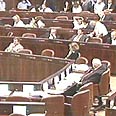
Cleared for publication: Security forces arrested a 58-year-old Israeli-Arab on suspicion of being recruited by Iran in order to infiltrate Israel's political system.
The suspect, Jaris Jaris, resides in the northern Israel village of Fasuta, which is mostly populated by Christians; he even served as the village council’s head.
It is suspected that Iranians plotted to have Jaris transfer intelligence information obtained through his political connections in exchange for a hefty sum of money. They hoped he would be able to become an MK and continue to transfer vital information to Iran.
Jaris was detained by security forces on December 12, 2005 on suspicion of being recruited to Iran’s intelligence service with the intent of gathering classified information that would be harmful to Israel if transferred to Iran.
The State Prosecutor’s Office plans to file an indictment against him soon.
“The interrogation of Jaris reveals severe Iranian espionage activity against Israel to obtain classified internal information in a bid to influence the actions of Israeli governing bodies,” a security source said.
In 1970 Jaris fled Israel for Lebanon after being active in Fatah. Upon his arrival in Lebanon, he continued to work on Fatah’s behalf and sent a terror cell to Israel.
Jaris returned to Israel in 1996 in the framework of the agreement that permitted the return of PLO members to Israel; he settled in the Galilee and served as Fasuta’s council head for two years, beginning May 2001.
So far the investigation into the affair shows that in September 2004 Jaris visited Cyprus to meet with Hani Abdullah, whom he had become acquainted with while residing in Lebanon, to advance the establishment of a research center in Cyprus.
Abdullah mentioned to him that the center could be funded by Hizbullah and Iranian sources he was in touch with; Jaris went along with the proposal.
Two months later Abdullah phoned Jaris, telling him that the he had found an organization that agreed to fund the research center and that he must come to Cyprus once again.
'Significant increase in attempts by Iranto recruit Israeli agents'
Jaris arrived in Cyprus in November 2004, where he met with an Iranian citizen, who was introduced as someone who may potentially fund the project.
During his interrogation Jaris said he understood the man was an Iranian agent, after the Iranian had asked him to conduct studies on Israeli society and politics and submit them to him within two days time.
The Iranian agent also ordered Jaris to enter Israeli politics, form ties with political figures and join a political party in exchange for monetary compensation.
Upon his return to Israel, Jaris proceeded to carry out his task, and in late 2004 joined the Yahad party with the assistance of a political activist he was acquainted with.
Jaris expressed to the activist his interest in becoming a Knesset member and asked to be introduced to MKs who visit Fasuta.
After gathering a significant amount of information, Jaris returned to Cyprus, where two Iranian agents questioned him on his political activity and connections in Israel.
Jaris was instructed to continue forming ties with senior Israeli political figures.
During the course of 2005 the Shin Bet identified a significant increase in attempts by Iranian intelligence to recruit Israeli agents in an effort to gather classified information on Israel.
According to security officials, Iran’s activity originates from foreign countries.
Security agencies have recently exposed Arab Israelis suspected of being connected to Iranian intelligence services; some served in positions that allowed them access to sensitive websites and information.
Current Fasuta council head, Dr. George Ayoub, responded to the report by saying that the actions of one man should not bring shame on an entire village.
“He is still only a suspect, but if he is guilty of the allegations, then he must be held accountable for his actions,” Ayoub said.
Ahiya Raved contributed to the report















